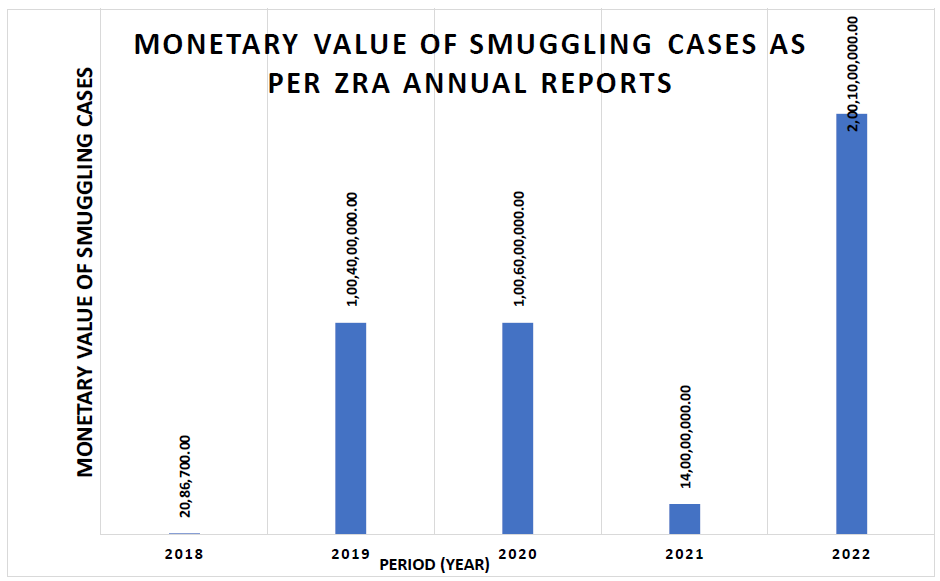An Investigation into the Effectiveness of Customs Strategies in Mitigating Smuggling of Goods in Zambia
DOI:
https://doi.org/10.5281/zenodo.10934684Keywords:
smuggling, taxes, willingness to payAbstract
This dissertation assesses customs strategies' effectiveness in curbing goods smuggling in Zambia. Despite efforts by the Zambia Revenue Authority (ZRA), which is a statutory body mandated to among other functions, collect revenue on behalf of the Zambian Government and tackle smuggling, the problem of smuggling remains pervasive, necessitating a comprehensive strategy review. Using a Mixed Method approach, the study combined qualitative and quantitative methods. Primary data was collected via semi-structured questionnaires, supplemented by desk research for secondary data. The study targeted individuals from the Zambia Revenue Authority (ZRA). The study aimed to conjure 100+ responses and key personnel interviews, using purposive sampling. Analysis employed a descriptive and interpretive design to identify themes, patterns, and relationships. Objectives included investigating the effectiveness of the existing customs strategies in mitigating smuggling of goods in Zambia, evaluating taxes' influence on smuggling, establishing the correlation between willingness to pay taxes and smuggling, and the effectiveness of policy, legal, and institutional frameworks against smuggling. Findings show that the existing customs strategies, while generally effective, needs enhancement. Furthermore, findings revealed a significant positive relationship between taxes and smuggling prevalence. However, the willingness to pay taxes and smuggling relationship is complex, suggesting other influencing factors. Evaluation of policy, legal, and institutional frameworks reveals challenges like corruption, resource inadequacy, and inter-agency coordination limitations, hindering effectiveness. Regarding law effectiveness in combating smuggling, perspectives vary. While some viewed the law as effective, others cited corruption, inadequate penalties, and resource constraints affecting implementation. The study recommended Continuous Monitoring and Adaptation. Given the dynamic nature of smuggling and its relationship with taxation, policymakers should continuously monitor and adapt strategies. Regular assessments of the effectiveness of customs strategies, tax policies, and awareness campaigns to encourage compliance in term of paying taxes are crucial to ensuring that interventions remain relevant and impactful in the evolving landscape of Smuggling activities. Furthermore, the study recommended implementing legal reforms that effectively target existing gaps, establish sanctions commensurate with the gravity of offences, and account for the evolving methods employed in smuggling activities.
Downloads
References
Alexander, S. (2018). The effectiveness of state structures in controlling the trafficking of illicit tobacco across Zimbabwean and South African borders. Global Initiative against Transinational Crime.
Chemouni, B. (2020). Revenue extraction is not enough: The ambiguous effectiveness of the Rwandan revenue authority.
Clarke, R. V. (1983). Situational crime prevention: Its theoretical basis and practical scope. Crime and Justice. An Annual Review of Research, 225-256.
Creswell, J. W. (2003). Research design qualitative, quantitative and mixed methods approaches. USA.
Davidovic, D., Harring, N., & Jagers, S. C. (2020). The contingent effects of environmental concern and ideology: Institutional context and people’s willingness to pay environmental taxes. Environmental Politics, 674-696.
Flynn, M. (2007). The complete book of international smuggling. Boulder: Paladin-Press.
Gallien, & Occhiali, G. (2023). No Smoking gun: Tobacco taxation and smuggling in Sierra Leone. Tobacco Control, 32(6), 729-733.
Geringer, S. (2021). National digital taxes–lessons from Europe. South African Journal of Accounting Research, 1-19.
Ndururi, G. (2018). Factors affecting customs in managing narcotics smuggling in southern region.
Ntanda, M. (2020). A critical analysis of the law in relation to goods smuggling in Zambia. Doctoral Dissertation, Cavendish University.
Ntanda, M. (2020). Customs and excise: A critical analysis of the law in relation to goods smuggling in Zambia. Lusaka: Cavendish University.
Nyambishi, K. (2020). Effects of beverage smuggling on business performance in the supply chain industry: A case study of cold chain Zambia limited.
Ospina, S. D. (2003). From consent to mutual inquiry: Balancing democracy and authority in action research. Unpublished Manuscript. s.l.:s.n.
Zambia Revenue Authority. (2021). Final year report on strategy and enforcement. Lusaka: ZRA.
Zambia Revenue Authority. (2019). Assesment of perfomance and tax compliance. Lusaka: ZRA.
ZRA. (2020). About us. ZRA. Retrieved From: April 226, 2020, From https://www.zra.org.zm.

Downloads
Published
How to Cite
Issue
Section
License
Copyright (c) 2024 Chipo Hamachila, Dr. Chaste Nsama

This work is licensed under a Creative Commons Attribution 4.0 International License.
Research Articles in 'Management Journal for Advanced Research' are Open Access articles published under the Creative Commons CC BY License Creative Commons Attribution 4.0 International License http://creativecommons.org/licenses/by/4.0/. This license allows you to share – copy and redistribute the material in any medium or format. Adapt – remix, transform, and build upon the material for any purpose, even commercially.









